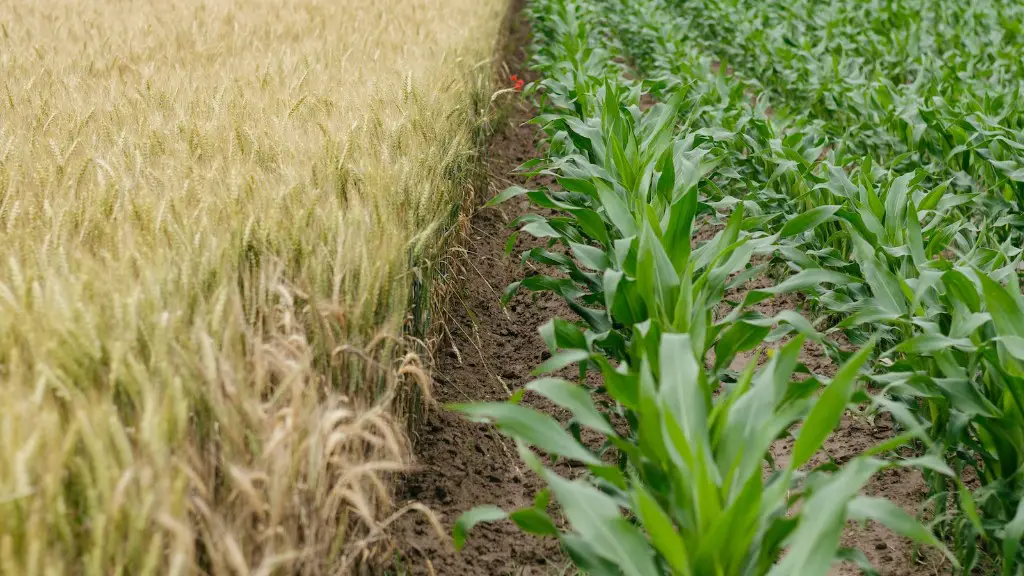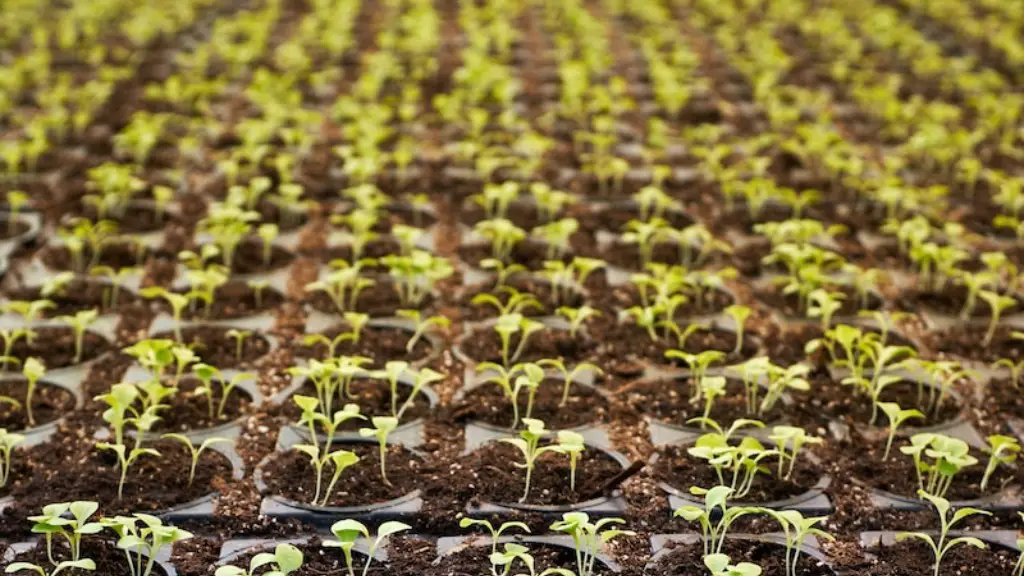Agriculture was a significant factor in the rise of industrial capitalism. By providing a consistent source of income,raw materials, and labor, agriculture formed the essential foundation upon which industrial production was built. This allowed industrial capitalists to build the organizational and infrastructural resources needed to support the rapidly growing industrial sector.
The concentration of agricultural labor in Europe and North America during the 19th century was critical to industrial capitalist expansion. By providing a ready pool of labor, agriculture allowed industrial capitalists to quickly expand and grow their businesses. This labor also provided for the construction and operation of factories, enabling industrial capitalists to process, transport and sell their products to a much wider market. As the industrial revolution spread, the supply of agricultural laborers and resources became increasingly important to industrial capitalists.
The mechanization of agriculture was another important factor in industrial capitalist expansion. The introduction of threshing machines increased productivity, expanded crop production and provided a reliable source of food. The development of steam engines and tractors allowed for more efficient and greater use of land, freeing up labor for other activities such as processing and transportation. By improving agricultural productivity and making it more economically viable, mechanization of agriculture enabled industrial capitalists to access the resources they needed.
The demand for agricultural produce was also an important factor in industrial capitalist expansion. The growth of cities, the rise of wage labor, and the growth of the world market meant that there was a huge demand for industrially produced goods. This in turn created a demand for agricultural produce to supply the needs of industrial production. This meant that there was a ready market for agricultural produce, providing a steady income for industrial capitalists.
In addition, the expansion of finance capital enabled industrial capitalists to invest in the agricultural sector. Farmers were able to secure loans to purchase land, build new farms and increase their production. This meant that industrial capitalists were able to access capital to expand their businesses and access new markets.
Finally, the development of transportation networks provided industrial capitalists with the means to access new sources of labor and raw materials. Railways, canals, and roads allowed industrial capitalists to easily access distant farms and expand their range of products.
In summary, agriculture was a major factor in the rise of industrial capitalism. By providing a reliable source of income, raw materials, and labor, agriculture enabled industrial capitalists to expand and grow their businesses. Mechanization of agriculture and access to capital enabled industrial capitalists to access the resources they needed and transport their goods to new markets. Finally, the expansion of finance capital and transportation networks allowed industrial capitalists to access new sources of labor and raw materials.
Mechanization of Agriculture
Mechanization of Agriculture was a crucial factor in the development of industrial capitalism. By improving productivity levels, expanding crop production and providing a reliable food source, mechanization allowed industrial capitalists to access the resources they needed. The steam engine was particularly important in driving the mechanization of agriculture, providing the necessary power to operate threshing machines, steam tractors, and other equipment. The increased use of mechanized equipment allowed farmers to not only increase their output, but also to open new markets as they supplied industrial capitalists with the necessary resources.
The availability of improved labor-saving devices such as the steam plow, reaper and thresher allowed farmers to maximize their output and work fewer hours. This freed up labor, giving farmers more time to devote to other tasks. This enabled industrial capitalists to access the labor they needed to operate and expand their businesses. In addition, mechanization increased the efficiency of agricultural production, reducing costs and making agricultural produce more affordable for industrial capitalists.
Mechanization also opened up new markets for agricultural produce. By providing a reliable source of food, mechanization allowed industrial capitalists to expand their businesses on a larger scale. It also allowed them to access a much wider market for their products, as mechanization created a continuous supply of farm products. Finally, mechanization increased economies of scale, allowing industrial capitalists to lower their costs and increase their profits.
Financial Capital and Agriculture
Financial capital was another important factor in the development of industrial capitalism, as it allowed industrial capitalists to access the financing they needed to open new markets and expand their businesses. Financial capital provided farmers with the means to secure loans to purchase land, build new farms, and increase their output. This allowed industrial capitalists to access capital to expand their businesses and access new markets.
The availability of finance capital was critical to the success of industrial capitalism, as it allowed for the efficient use of resources and the flow of capital to those who needed it. By providing farmers with credit, access to the necessary technology, and infrastructure investment, finance capital enabled industrial capitalists to access new markets, expand their production, and increase their profits.
The development of a modern banking system was also an important factor in industrial capitalist expansion. With the development of banks, industrial capitalists were able to access large pools of capital from around the world and invest in their businesses. By accessing finance from these banks, industrial capitalists were able to fund the construction of factories, purchase new machinery, and expand their operations.
In addition, the development of specialized financial instruments such as stocks, bonds, and derivatives enabled industrial capitalists to access capital from a larger pool of investors. By providing access to the capital needed to invest in agriculture, and to finance research and development, these instruments allowed industrial capitalists to take advantage of larger capital investments and increase their profits.
Transportation Networks
The development of transportation networks such as railways, canals, and roads, was also a critical factor in the growth of industrial capitalism. Transportation networks allowed industrial capitalists to access new sources of labor and raw materials, and to move their goods over long distances. This improved the efficiency of supply chains, enabling industrial capitalists to access larger markets and increase their profits.
The development of a railway network in Europe and North America, for example, was instrumental in the growth of industrial capitalism. Railways allowed industrial capitalists to easily access distant farms and expand their product range. They also allowed industrial capitalists to move their finished products over long distances, making them available to much larger markets. This enabled industrial capitalists to access larger markets, and increase their profits.
In addition, the development of canals and roads allowed for more cost-effective transport and the movement of bulky goods. This allowed industrial capitalists to access new markets, as it was now possible to move large amounts of goods over long distances. This increased efficiency and enabled industrial capitalists to access larger markets, and thus to increase their profits.
Finally, the development of a reliable and efficient postal system was also an important factor in industrial capitalist expansion. By providing access to new information and data, the postal system allowed industrial capitalists to access a much wider range of markets. This enabled industrial capitalists to access new markets, and thus to increase their profits.
Supply of Agricultural Produce and Resources
The supply of agricultural produce and resources was also an important factor in industrial capitalist expansion. The growth of cities, the rise of wage labor, and the growing world market created a huge demand for industrially produced goods. This in turn created a demand for agricultural produce to supply the needs of industrial production. This meant that there was a ready market for agricultural produce, providing a steady income for industrial capitalists.
The growth of cities also increased the demand for farm laborers for processing and transportation. This provided a steady source of income for farmers, enabling them to increase their production and improve their profitability. This in turn allowed industrial capitalists to access the resources they needed to expand their businesses and access new markets.
The development of trade networks allowed industrial capitalists to access new sources of raw materials and labor. By establishing trade networks, industrial capitalists were able to transport their goods to larger markets. This increased efficiency and allowed for the expansion of industrial capitalism.
In addition, the rise of wage labor enabled industrial capitalists to access a vast pool of labor. This provided them with access to a large labor force, allowing them to operate and expand their businesses on a larger scale. This enabled industrial capitalists to access larger markets and thus to increase their profits.
Finally, the expansion of finance capital enabled industrial capitalists to invest in the agricultural sector. By providing access to the necessary capital, industrial capitalists were able to expand their businesses and access new markets. This increased efficiency and allowed industrial capitalists to maximize their profits.





